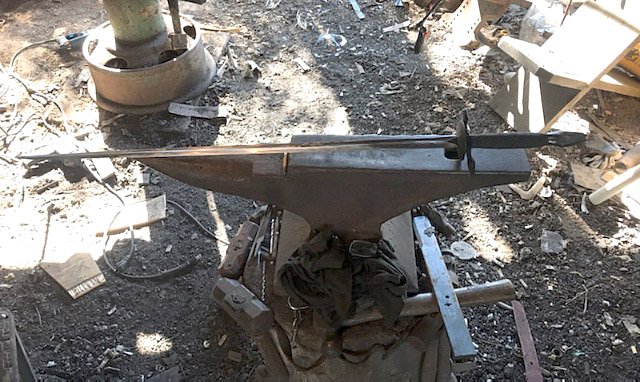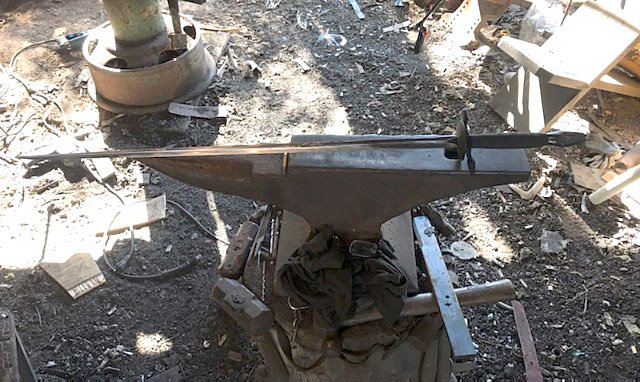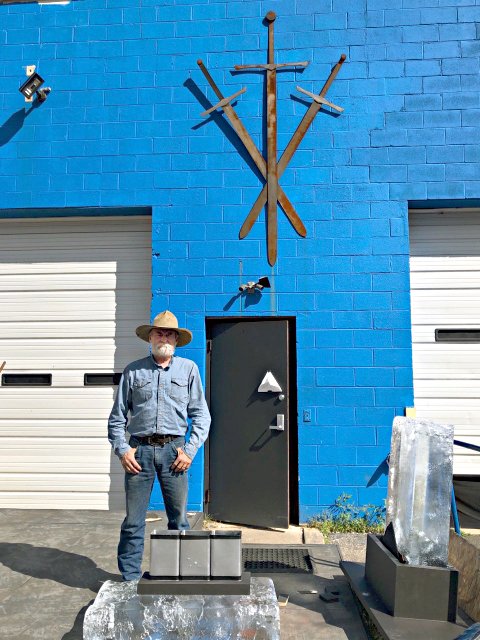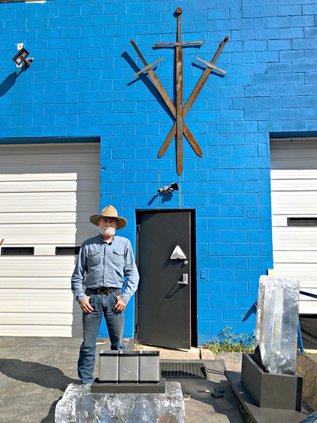Before being selected to compete on the History Channel’s bladesmithing series “Forged In Fire,” Trevor Crowell of McCracken said he’d never watched the show much.
After three grueling rounds of competition against three other expert bladesmiths, though, the Rush County native’s work prevailed, granting him the show’s $10,000 top prize on the episode which aired Wednesday, April 1.
The show, as host Wil Willis describes to the competitors, is, “an edged weapon competition specifically designed to test every aspect of your skills.”
Crowell said family members who watched the show encouraged him to apply for it.
“I didn’t really know what it was all about,” Crowell said. “My sister-in-law and nephew have been wanting me to get on the show since it started, and they finally talked me into it.”
Crowell, who was a police officer in Rush County for many years, said having more downtime now freed up the extended time necessary to compete on the show, and allows him to focus more on his knife-making business, Rocking T Knives.
Smithing roots
Though he’s had other jobs, bladesmithing is a passion Crowell said he’s pursued since he was young, and was inspired to the trade early playing with his friends.
“I love history, and reenacting. Even when I was a little kid, 10 or 11, me and my buddies would go out camping, and playing around,” he said.
He said he’d always loved knives, and decided early to try to make one. He joked that the first attempt, “didn’t go very well.”
“I started messing around with wrought iron, and my dad brought home an old forge for me to use,” he reminisced. “I was 14 or 15 when he brought that home, and that’s the one I’m still using right now.”
The experience gleaned from years of experience on that equipment, he said, helped him on the show.
Competition challenges
In the first round of the competition, for example, in an unusual twist for the show, the competitors were asked to forge in the style of Iron Age smiths, outdoors and completely without the use of electricity or power tools, with only hand tools and manual coal forges.
Crowell, who has over four decades of forging experience, said the lack of power tools was not the biggest challenge for him, because a coal forge is what he has always used at his home forge in rural Rush County.
What he was not used to in the first round, he said, was working outdoors without cover. Though his home forge is outdoors, Crowell said he has always built himself a lean-to to work under to protect himself from the direct sunlight. The heat of the equipment and the strain of three straight hours of work, plus direct sunlight without cover, threatened to derail Crowell’s chances early due to exhaustion issues.
Crowell described the process as, “both physically and mentally draining,” though he was able to persevere though it.
He said the time constraints placed on each round of competition were also a challenge.
“The time limits were terrible,” Crowell said. “They provided us a lot of really nice equipment to use, but that’s a lot of work to get done in that short of a time period.”
The first round, for example, asked the smiths to forge a dagger in just three hours with only the ancient tools at their disposal.
Competitive camaraderie and experience
Crowell said he enjoyed being able to get to know and work with other skilled smiths.
Crowell, who describes himself as someone who does not like competition and “not a camera guy,” viewed the other smiths more as colleagues than competitors.
“They’re a heck of a bunch of nice guys, and we’re still friends,” Crowell said, adding he still talks to them usually about once a week.
He has the utmost respect for the other smiths he competed with and said, given their high skill level, he is surprised he made it as far as he did.
“They’re all really good knife makers,” Crowell said.
Crowell said he went into the show with the mindset he was competing more with himself than he was against the other smiths.
“I was gonna try to do the best job that I could, and that’s what I tried to do,” he said.
Because of his high respect for the other smiths and the challenges they all faced, Crowell said he felt bad for each of them as they were eliminated through the three rounds of competition.
Along with the competitors, Crowell said the crew and judges were kind and helpful, and though they could not help much during the show, the judges spent time conversing with the smiths offering congratulations and answering questions. The camaraderie did not surprise him.
“I think you find that in knife makers, anyway,” Crowell said. “If you’re in their crowd, you’re automatically their friend.”
He said he enjoyed the experience more than he thought he would. “It’s one of the most fun times I’ve had in many years.”
For example, Victor Gonzalez of San Antonio, Texas, the smith he competed against in the final round of competition, was also an amateur magician who would perform card tricks in the green room during breaks when the show’s set was being reset for the rigorous testing the blades undergo as part of the competition.
Winning the final round
That rigorous final-round testing, he said, was the most nerve-racking part of the whole experience.
The challenge for the final round was for each smith to return to his home forge for four days to recreate an iconic historical weapon, then return to the set to test it.
In this case, the weapon was the épée de combat, a historical french dueling sword, a version of which was wielded by the fictional character Arya Stark from the book and television series, “Game of Thrones.” It was a challenge, Crowell said, because, despite his decades of expertise in bladesmithing, he’d never had to make a sword before,
Because he had previously tested the blade at home before returning to the show for testing, he felt pretty confident it would hold up,
But the blade’s light, thin design left him concerned that it might bend or break in the course of testing.
The tests conducted by the judges, in this case, included a “kill test,” which involved repeated stabs and slices into a ballistic gel dummy with bone and organs added to simulate the human torso; a “strength test,” which involved repeated hard jabs into a large block of ice; and a “sharpness test,” which involved stabs into a thick tin canister followed by a slice into an elevated water bag. They are designed to test both the strength and durability of the competitors’ blades.
“The nerves were pretty high,” he said, “I was just worried that it was going to break or bend or something.”
When the judges gave him the title of “Forged In Fire Champion,” though, he was thrilled.
“I can’t believe I won “Forged In Fire,” he commented at the end of the show. “It feels better than good.”






